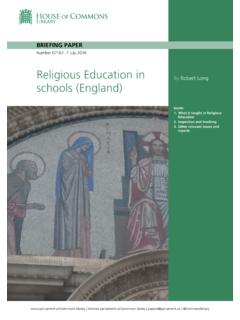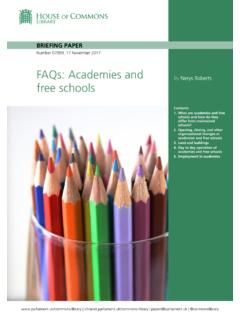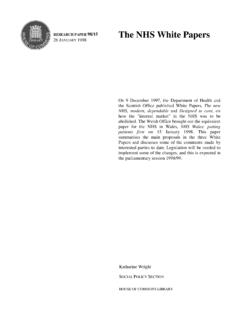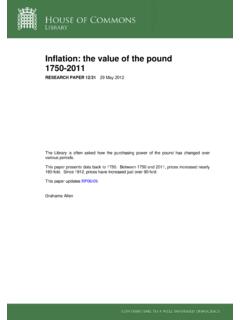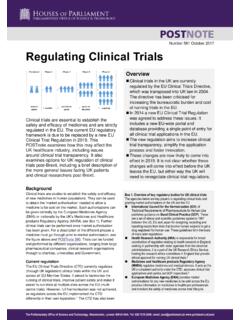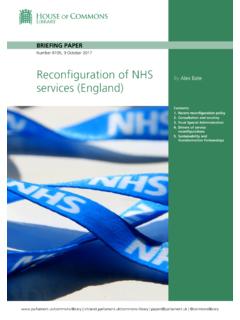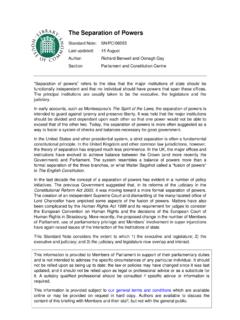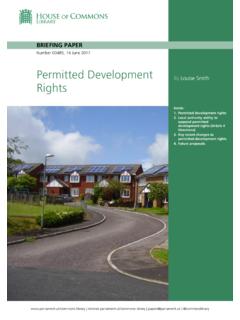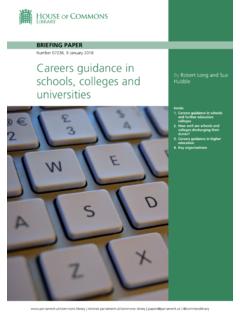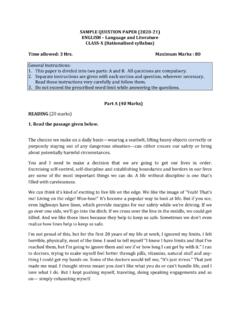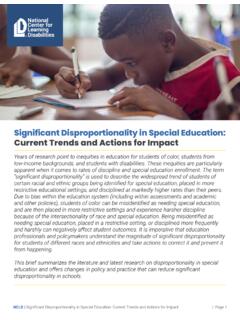Transcription of Language teaching in schools (England)
1 BRIEFING PAPER. Number 07388, 17 January 2020. Language teaching in By Robert Long schools (England Shadi Danechi, Philip Loft Contents: 1. What must be taught 2. Quality of provision, levels of achievement 3. A strengthened English Baccalaureate and Progress 8: potential impact on languages 4. Other issues: Proposed additions to the Language curricula and reviews on the marking of languages 5. Reports and Commentary 6. Statistics: modern Language entries and teacher numbers | | | @commonslibrary 2 Language teaching in schools (England). Contents Summary 3. 1. What must be taught 4. The National Curriculum: maintained schools 4. Requirements for languages 4. Programmes of study 5. Academies and Free schools 6. GCSE, AS and A level subject content 6.)
2 2. Quality of provision, levels of achievement 8. Ofsted reports 8. Language teaching : support and quality 9. Language trainee teacher support 9. Quality of Language teaching 11. European survey on Language competences (2013) 12. British Council report: Language Trends report (2019) 13. 3. A strengthened English Baccalaureate and Progress 8: potential impact on languages 15. Introduction: performance measure 15. A strengthened EBacc: Since 2015 15. Supply of Language teachers: concerns and consultation 16. DfE Annual Report 2018/19: The Language barrier to the EBacc 18. Progress 8 18. 4. Other issues: Proposed additions to the Language curricula and reviews on the marking of languages 19. Review of Modern Foreign Language Marking and Content 19.
3 National Centre for Excellence for Languages Pedagogy 19. teaching community and less-commonly spoken languages 20. Withdrawal of languages at GCSE level and Government action 20. Announcement on the continuation of some languages (April 2016) 21. Mandarin Excellence Programme 22. British Sign Language (BSL) 22. A British Sign Language GCSE in England? 22. 5. Reports and Commentary 24. Higher Education Policy Institute, A languages crisis? (2020) 24. CBI survey of employers' views (2019) 25. Cambridge University report: The value of languages (2016) 25. All-Party Parliamentary Group on Modern Languages (2014 & 2019) 26. Manifesto for Languages (2014) 26. National Recovery Programme for Languages (2019) 27. British Council: Languages for the Future report (2013 & 2017) 27.
4 6. Statistics: modern Language entries and teacher numbers 29. Entries 29. GCSE entries 29. A-Level entries 30. Additional Data Tables 31. Language teachers 32. 3 Commons Library Briefing, 17 January 2020. Summary Language learning in England is consistently poor when compared with foreign Language learning in other countries. The European Commission's Flash Barometer Report found that in April 2018 32% of UK 15-30 year olds felt confident reading and writing in two or more languages, compared to 79% in France, 91% in Germany, and 80% on average across EU member states ( ). There have been regular calls from industry and educational bodies for the levels of attainment to be raised. Languages are a part of the National Curriculum in England from ages 7-14, with the requirements at Key Stage 3 specifying that a modern Language is taught.
5 Revised content for GCSE, AS and A level languages has been in place since September 2016. Most pupils will be required to take a GCSE in a modern Language under Government plans for the English Baccalaureate (EBacc) to be taken by 75% of year 10 pupils by September 2022, and 90% of pupils by 2025. Ofsted reports have found important strengths in Language teaching in English schools , alongside significant weaknesses. A 2015 report on Key Stage 3 identified modern languages classes as requiring significant improvement, particularly in light of the introduction of the strengthened EBacc. A 2016 report by Ofsted also raised concerns on Language teaching in primary schools . Most schools teach one or more of French, German and Spanish, but the Government does not promote the teaching of particular languages.
6 In 2015, concerns were raised about the withdrawal of GCSE and A level qualifications in lesser-taught languages such as Arabic, Japanese and Polish. Following discussions between the Government and exam boards, qualifications in many of these languages were retained. This briefing relates to England only. It discusses the teaching of ancient and foreign languages (including sign Language ), and does not include information on the teaching of English for students with another first Language . Contributing authors: Robert Long, Social Policy, sections 1-5. Shadi Danechi, Social and General Statistics, section 6. 4 Language teaching in schools (England). 1. What must be taught The National Curriculum: maintained schools Requirements for languages The National Curriculum must be taught in all local authority- maintained schools in England (this requirement does not apply to academies and free schools see section ).
7 The National Curriculum Framework sets out that languages are required to be taught at Key Stages 2 and 3; that is, from ages 7-14. At Key Stage 2, the requirement is for a foreign Language to be taught; at Key Stage 3 the requirement is specifically for a modern foreign Language . After the age of 14, all pupils in maintained schools have a statutory entitlement to provision in four entitlement areas', one of which is the study of a modern foreign Language : [The other entitlement areas] and [a] modern foreign Language are not compulsory national curriculum subjects after the age of 14, but all pupils in maintained schools have a statutory entitlement to be able to study a subject in each of those four areas. 1. schools must provide access to a minimum of one course in each of the four entitlement areas 2.
8 schools must provide the opportunity for pupils to take a course in all four areas, should they wish to do so 3. a course that meets the entitlement requirements must give pupils the opportunity to obtain an approved qualification. 1. At Key Stage 2 (ages 7-11), the Framework states: teaching may be of any modern or ancient foreign Language and should focus on enabling pupils to make substantial progress in one Language . The teaching should provide an appropriate balance of spoken and written Language and should lay the foundations for further foreign Language teaching at key stage 3. 2. At Key Stage 3 (ages 11-14): teaching may be of any modern foreign Language and should build on the foundations of Language learning laid at key stage 2, whether pupils continue with the same Language or take up a new one.
9 3. Languages have been included on the curriculum at Key Stage 2 since September 2014. It was introduced as one of the changes made following the Coalition Government's National Curriculum review. The Library briefing on The School Curriculum in England, SN06798, provides background. 1. Department for Education, The national curriculum in England: framework document, p7. 2. Ibid., p213. 3. Ibid., p215. 5 Commons Library Briefing, 17 January 2020. Programmes of study Programmes of study have been published for languages study at Key Stages 2 and 3. The programme of study for Key Stage 2 states that: Pupils should be taught to: 1. listen attentively to spoken Language and show understanding by joining in and responding 2. explore the patterns and sounds of Language through songs and rhymes and link the spelling, sound and meaning of words 3.
10 Engage in conversations; ask and answer questions; express opinions and respond to those of others; seek clarification and help*. 4. speak in sentences, using familiar vocabulary, phrases and basic Language structures 5. develop accurate pronunciation and intonation so that others understand when they are reading aloud or using familiar words and phrases*. 6. present ideas and information orally to a range of audiences*. 7. read carefully and show understanding of words, phrases and simple writing 8. appreciate stories, songs, poems and rhymes in the Language 9. broaden their vocabulary and develop their ability to understand new words that are introduced into familiar written material, including through using a dictionary 10. write phrases from memory, and adapt these to create new sentences, to express ideas clearly 11.

